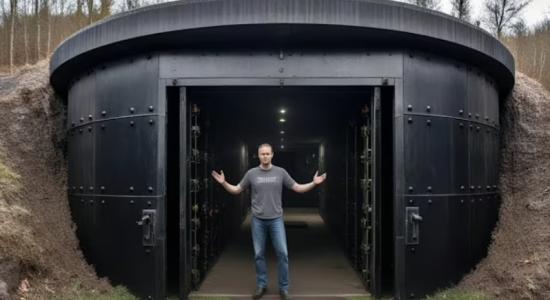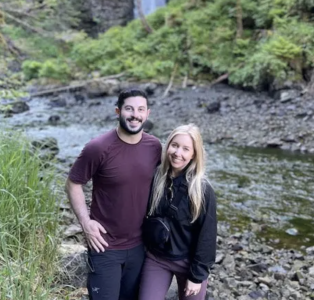Inside a real doomsday bunker: 15 survival must-haves preppers say you’ll need to last a year
By
Veronica E.
- Replies 0
When disaster strikes, most people think of stocking up on bottled water, canned food, and batteries—but for some, preparedness goes far beyond the basics.
Across the world, a growing number of “preppers” are creating detailed survival plans that could sustain them for months or even years.
From reinforced bunkers to high-tech communication devices, these individuals are building a safety net for any kind of emergency.
Whether you call it cautious planning or extreme readiness, their approach is attracting attention, especially as global uncertainties continue to make headlines.
Here’s a look inside one couple’s fully stocked bunker and the 15 essential items experts say can make all the difference.

Meet the modern preppers: Carrie and Colton’s story
Carrie and Colton Smith, a couple from Montana, have taken emergency preparedness to the next level.
Their journey began in early 2023 when a Chinese surveillance balloon was spotted over the US, sparking widespread concern.
For Carrie, who grew up in earthquake-prone California, it was the final push to start building a robust survival plan.
“I realized I needed to take matters into my own hands,” she explained.
Since then, she’s built a following of over a million people online, sharing tips as @housewifeprepper.
Also read: Grandma’s quick action helps avert disaster mid-flight
Inside the bunker: 15 must-have survival items
So, what makes the Smiths feel confident they could live off-grid for a year?
Here’s their checklist of essentials, along with what other seasoned preppers recommend:

Also read: Taking stock: Doomsday prepper reveals $430K bunker and how you can start your own emergency stash
Prepping isn’t just for "doomsday" scenarios
For many, preparedness isn’t about expecting the worst—it’s about being ready for any disruption.
Whether it’s a multi-day blackout, a sudden evacuation, or unexpected shortages, basic supplies can make a big difference in comfort and safety.
Taking the time to prepare now means you won’t be scrambling when every store shelf is empty.
It’s a simple way to protect your peace of mind, no matter what comes your way.
Source: Instagram / housewifeprepper and housewifeprepper2.0
Also read: How much emergency savings is enough? Experts say this number is growing—and here’s how to prepare
Getting started without overspending
Experts recommend starting small and building your stockpile over time.
Rotate stored food to prevent waste, and invest in practical skills like first aid and basic home repairs.
Above all, remember that community is a critical resource—getting to know your neighbors can be as valuable as any piece of gear.
Source: Instagram / housewifeprepper
Being prepared doesn’t have to mean living in fear—it’s about giving yourself and your loved ones the best chance to stay safe and comfortable when the unexpected happens.
Even small steps, like gathering basic supplies or learning practical skills, can make a big difference in a crisis.
Start today, and you’ll thank yourself tomorrow if disaster ever strikes.
Read next: The 16 emergency kit essentials experts say every household should have—are you ready?

Have you built an emergency kit, or are you thinking of starting one? What’s the one item you wouldn’t want to be without in a crisis? Share your thoughts and tips in the comments so we can help each other prepare for whatever comes next!
Across the world, a growing number of “preppers” are creating detailed survival plans that could sustain them for months or even years.
From reinforced bunkers to high-tech communication devices, these individuals are building a safety net for any kind of emergency.
Whether you call it cautious planning or extreme readiness, their approach is attracting attention, especially as global uncertainties continue to make headlines.
Here’s a look inside one couple’s fully stocked bunker and the 15 essential items experts say can make all the difference.

A well-stocked doomsday bunker packed with essential supplies for long-term survival. Image Source: YouTube / Not Fake: fyp.
Meet the modern preppers: Carrie and Colton’s story
Carrie and Colton Smith, a couple from Montana, have taken emergency preparedness to the next level.
Their journey began in early 2023 when a Chinese surveillance balloon was spotted over the US, sparking widespread concern.
For Carrie, who grew up in earthquake-prone California, it was the final push to start building a robust survival plan.
“I realized I needed to take matters into my own hands,” she explained.
Since then, she’s built a following of over a million people online, sharing tips as @housewifeprepper.
Also read: Grandma’s quick action helps avert disaster mid-flight
Inside the bunker: 15 must-have survival items
So, what makes the Smiths feel confident they could live off-grid for a year?
Here’s their checklist of essentials, along with what other seasoned preppers recommend:
- Generators (and fuel): The Smiths own four generators to keep power running for fridges, medical equipment, and charging devices.
- Water storage: Three 55-gallon drums—enough to maintain at least 1 gallon per person per day for drinking, cooking, and hygiene.
- Long-life food: Freeze-dried meals with a 25-year shelf life, plus staples like rice, beans, and canned vegetables.
- Water filtration: Portable filters and purification tablets in case water needs to be sourced from rivers or lakes.
- Protection: In the US, this may include firearms and tasers; in Australia or other regions, alternatives might be alarms, secure locks, or legal self-defense sprays.
- Solar panels: A renewable energy source to stay powered without relying on the grid.
- Satellite phones: For communication when cell networks fail.

Carrie and Colton Smith, both in their mid-30s, began preparing for emergencies in early 2023. Image Source: Carrie Smith / SWNS / New York Post.
- Solar-crank radios: To receive weather updates and emergency alerts without electricity.
- Life raft: For flood preparedness; some preppers credit these with saving lives.
- First aid kit: Includes bandages, antiseptics, pain relief, and prescription medications.
- Warm clothing and blankets: For temperature drops when heating isn’t available.
- Multi-tool or Swiss Army knife: Useful for repairs, cooking, and countless other tasks.
- Batteries and flashlights: Always stocked in abundance.
- Hygiene supplies: Toilet paper, soap, feminine products, and disinfectants.
- Important documents: Waterproof copies of IDs, insurance, and medical records.
Also read: Taking stock: Doomsday prepper reveals $430K bunker and how you can start your own emergency stash
Prepping isn’t just for "doomsday" scenarios
For many, preparedness isn’t about expecting the worst—it’s about being ready for any disruption.
Whether it’s a multi-day blackout, a sudden evacuation, or unexpected shortages, basic supplies can make a big difference in comfort and safety.
Taking the time to prepare now means you won’t be scrambling when every store shelf is empty.
It’s a simple way to protect your peace of mind, no matter what comes your way.
Source: Instagram / housewifeprepper and housewifeprepper2.0
Also read: How much emergency savings is enough? Experts say this number is growing—and here’s how to prepare
Getting started without overspending
Experts recommend starting small and building your stockpile over time.
Rotate stored food to prevent waste, and invest in practical skills like first aid and basic home repairs.
Above all, remember that community is a critical resource—getting to know your neighbors can be as valuable as any piece of gear.
Source: Instagram / housewifeprepper
Being prepared doesn’t have to mean living in fear—it’s about giving yourself and your loved ones the best chance to stay safe and comfortable when the unexpected happens.
Even small steps, like gathering basic supplies or learning practical skills, can make a big difference in a crisis.
Start today, and you’ll thank yourself tomorrow if disaster ever strikes.
Read next: The 16 emergency kit essentials experts say every household should have—are you ready?
Key Takeaways
- A Montana couple has stocked enough supplies to survive off-grid for a year, sparked by the sighting of a Chinese surveillance balloon in early 2023.
- Their bunker includes multiple generators, large water reserves, long-lasting freeze-dried food, and methods of protection.
- Additional key items include solar panels, satellite phones, a life raft, and solar-crank radios for emergency updates.
- Preparedness experts recommend building supplies gradually, rotating stored food, and learning practical skills such as first aid.
Have you built an emergency kit, or are you thinking of starting one? What’s the one item you wouldn’t want to be without in a crisis? Share your thoughts and tips in the comments so we can help each other prepare for whatever comes next!






